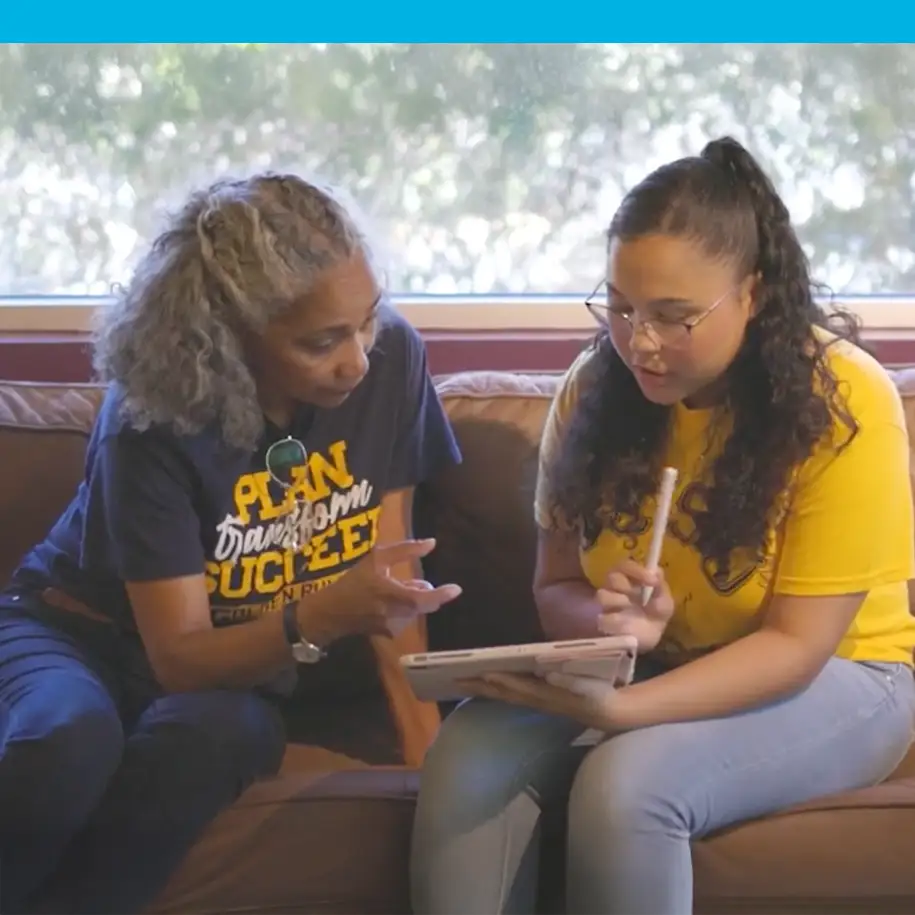
5 ways to support today’s online learner
How to help students feel seen, supported and connected as they pursue their programs online
Today’s online learner is a far cry from the intrepid few who dove boldly into the modality 20 years ago. And the “online learner” continues to evolve with the format itself. According to statistics from the IPEDS database, in 2012, 26% of all higher ed students took at least one online course. That number continued to rise steadily, and by 2019, 37% of higher ed students were taking at least one online course. Then came the pandemic, which radically shifted things overnight: in 2020, 74.1% of students were taking online courses. By 2022, that number had leveled off to around 54% — which means that over half of all college and university students are taking at least one of their courses, and possibly more, online.
The online format is particularly well suited to adult learners, students who work and students with families. Giving learners more control, online coursework offers a compelling, manageable way to complete degree or credential requirements. Below are five concrete ways you can help your online students feel their academic pursuits are worthwhile — and that they have the support they need to succeed.
1. Make online learning learner-centered, demand-driven and career-advancing
At the recent 2024 national UPCEA conference, Maria Flynn, president of Jobs for the Future (JFF), discussed the importance of ensuring that online learning is learner-centered and demand-driven as well as directly related to a career. Getting a degree isn’t the only way to reap the benefits of online education. Microcredentials, such as certificates and badges, are time- and cost-effective alternatives to traditional college degrees. These increasingly popular alternative credentials are particularly appealing to adult learners looking to upskill or reskill. Fostering these shorter, more accessible ways to achieve higher paying jobs shows that you understand why they’re in school and that you’re committed to helping them succeed.
Adult online learners in particular often have a specific career goal, having entered their course of study to advance in their current job or switch to a new field. Whether you’re supporting them through a degree program or microcredential, by letting these students know early on how your online program aligns education goals with career objectives, you’re helping them feel heard and understood. Dr. Laura Leatherwood, president of Blue Ridge Community College and leader in the statewide NC Reconnect re-enrollment initiative, knows this very well and makes sure it’s reflected in how they talk about their programs. “We changed the message to make it ‘Better Skills. Better Jobs.’ So if you come to us and you learn better skills and have more education, then you’re going to get a better job. That resonates with adults. We know our adults do not come to campus to play frisbee on the quad.”
An important way to support and attract career-motivated learners is to keep your program offerings relevant and reflective of the current job market. Talk to employers to find out what degrees and credentials they find valuable and then work on making sure your online program offerings can innovate to meet ever-changing market needs. As Asher Haines, associate provost in the School of Professional Studies at the University of North Carolina-Charlotte notes in a recent article about online learning trends, "With technology changing everyone's jobs so quickly, people have to be lifelong learners if they want to be lifelong workers."
2. Help cultivate a sense of belonging
Online learners are a complex lot. They can feel both connected to and separate from the college or university they’re attending. Fostering a sense of belonging in this valuable segment of learners can go a long way in helping them persist and succeed.
Small overtures — checking in with online students, making sure they know you’re available and happy to answer their questions, providing encouragement whenever possible — can go a long way to help the online community of learners feel more connected to your institution. At the end of the day, these students just want to feel that their school wants them there. This applies even more to adult online learners. It’s important to make it clear that your institution acknowledges and embraces every kind of student. “When I was an adult learner, on day one, I was asking myself ‘Do I belong here?’ And all I needed was one faculty member or one staff member to say, ‘You belong here. And you’re going to do great,’” shares Mike Krause, senior advisor for the John M. Belk Foundation, who now works to support adult learners across North Carolina via NC Reconnect.
Reminding online students about the wealth of campus resources available to them can also bolster their sense of belonging. Online students may be wholly unaware of what their school has to offer — everything from grant and financial aid information to time management strategies, free tutoring and mental health support. A great resource to highlight to online students is the career counseling center, staffed by student support professionals focused on all things career-related. They offer invaluable assistance to students unsure about their major, program of study or career path. They can also help with internships, apprenticeships, interviewing and career research. After all, their sole purpose is helping students — all students — find and attain jobs they love or transition into new ones. Getting such invaluable guidance and support from school staff will only help foster a sense of connection and belonging for learners.
3. Reduce barriers to online learning
A big part of the appeal of online learning is its flexibility. Maximize this benefit by making sure that you’re also offering accelerated courses, condensed class schedules and modalities that account for and accommodate all the other obligations your online learners face every day. Another way to meet the unique needs and schedules of online students is to make support services (those on-campus services you were just encouraged to remind them about) available outside of the traditional 9am-5pm window.
Many of these learners have families, work full-time jobs and/or act as caregivers. They plan school around their life, not life around their school. So offering additional hours on the weekend, on certain weekdays, and/or in the evening at least once a week would be a huge help. How about Fridays? Friday may typically be a slower support-use day on campus, but many online learners use their Fridays differently, as an important time to get prepared for the weekend ahead.
Another way to smooth the path for online learners includes offering or informing them of benefits and support specific to their situation, such as academic preparedness support and financial aid benefits. For adult online learners, this could also include debt relief and employer-sponsored education benefits, guidance from someone who can help them with the re-enrollment process, resources and support for familial care obligations, and school credit for prior learning and/or on-the-job experience.
All sorts of things — including finances, mental health and belonging, as well as academics — can affect an online learner’s ability to succeed. Using the focus wheel can help supporters identify possible barriers that may extend beyond the virtual classroom. Addressing these barriers can have a huge impact on learner success and retention.
Want to learn more about supporting your adult learners? Listen to Inside Higher Ed’s Voices of Student Success: Supporting Adult Learners podcast as two higher ed professionals share their insights on how best to serve this important population.
4. Encourage investment in planning and support structures
First and foremost, make it clear to online students that it’s okay to ask for help and ask questions — lots of questions. Whether they’re doing it online or in person, no one finds going to college, going back to college or undertaking a credential program easy. For all students — and most especially for those learners who are juggling family, a job and their studies — carving out the time necessary for school takes planning and, ideally, the support of the people around them.
A weekly planner or scheduling app can prove highly useful as a place to visually map out each semester, blocking out class times and entering all important dates (such as homework deadlines and exam times). Students should be sure to add in their work and family obligations too. They should also reserve blocks of time for doing homework and studying. If a student has school-aged children, it might be helpful to create a family study period where everyone is working on their homework at the same time.
Teamwork makes the dream work, as they say, so encourage online students to build a support system for themselves. They should share their goals with their family, coworkers and friends and let them know how best to lend support throughout the duration of their program.
5. Build up online learner confidence
Perhaps most importantly, help nurture online learners’ self-confidence and belief in themselves. According to a Public Viewpoints report from Strada, nearly half of all adults who responded to a national survey cited “self-doubt” as one of the largest challenges they would face if they returned to school — a concern ranking even higher than cost. Feeding this self-doubt is social media, leading working adults to believe that they have to be perfect to be successful. Encourage online learners to let perfectionism go. Not only is it an impossible goal, but striving for perfection also sets learners up for failure.
The best thing you can do for your online students is to flip the script on failure. Failure is a powerful teaching tool, another important way to learn and grow. Remind them that bumps along the way are the norm, not the exception. To help the students they work with ride out the rough patches, InsideTrack coaches ask them to tap into their “why” — their initial motivation for pursuing their studies — to quash that voice in their heads that causes them to doubt themselves. The difference between a dropped-out learner and one with a degree or credential can be as simple as the right support at the right time.
Looking for more insights on strengthening student support for adult online learners as they work toward their educational and career goals?
Coaching solutions proven to advance all learners
Whether you’re looking to help students persist through completion or to improve career outcomes for job seekers and employees, our holistic coaching solutions can help you achieve meaningful outcomes.



